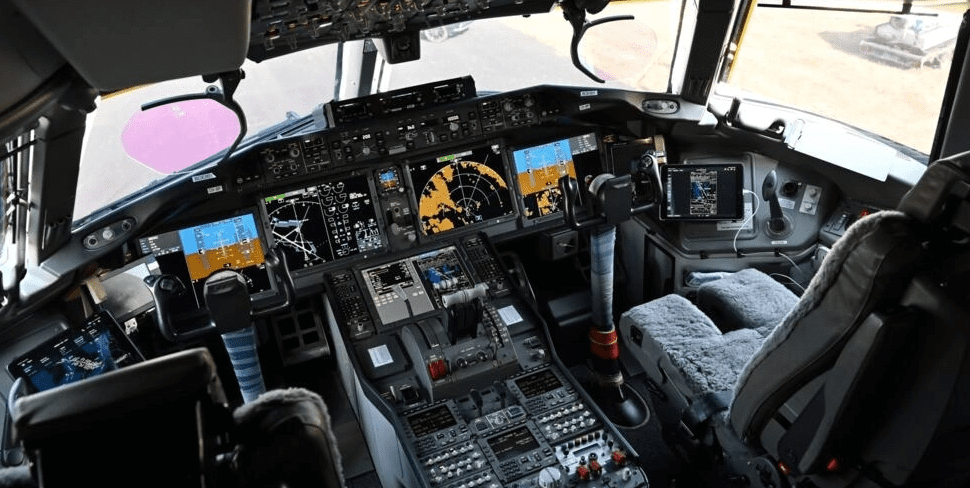In Paris, France, there is a surge of false GPS signals near conflict zones, which are causing problems for airline pilots, according to industry workers and officials who spoke to AFP.
For example, a ground collision alert may go off in the cockpit when the plane is flying at a high altitude, and this issue seems to be related to military activity and is affecting multiple regions.
Pilots and officials interviewed by AFP have mentioned the areas near Ukraine, the eastern Mediterranean, and the air corridor above Iraq as being affected by these disruptions.
Previously, disruptions were limited to jamming signals from geolocation satellites, but now they are taking on a more dangerous form, making it hard to combat spoofing.
This results in a plane receiving false information about its coordinates, times, and altitudes.
Thierry Oriol, a Boeing 777 pilot and member of the SNPL, the main French pilots’ union, told AFP that the plane's systems may mistakenly conclude that there is imminent danger by comparing this false data to its geographical maps.
Oriol explained that there were alarms ordering unnecessary maneuvers to avoid nonexistent obstacles while the plane was cruising at high altitudes.
He also mentioned an incident near Beirut where the plane thought it was much higher above sea level than it actually was.
A manager at a European airline, speaking anonymously, explained that the problem is that this false information can cause misleading alerts hours later as the flight approaches its destination.
Crews quickly recognize that the initial alarm was false, but due to the seriousness of the warning, they are still required to carry out emergency maneuvers and return for analysis.
If the problem occurs again without any evident danger, the only solution is to turn off the alarm, while other systems remain active to detect potential risks.
The widely used GPS is part of the global navigation satellite system (GNSS) managed by the American army, which is now experiencing disturbances from false signals.
Additionally, there are two other systems, the European Galileo and Russia’s GLONASS.
Airliners primarily rely on GNSS to determine their positions, but they also have other tools available for this purpose.
These devices have inertial orientation systems that capture movement to understand an object’s trajectory, although their precision decreases during the flight.
Since the war in Ukraine began, the European Union Aviation Safety Agency (EASA) has warned of intensified disruptions to GNSS signals, affecting even remote regions beyond the conflict zone, such as Finland and the Mediterranean.
In some cases, this can lead to a changed trajectory or destination due to the unavailability of secure landing conditions, as stated by the EASA.
The group in charge of health and safety regulations for Air France pilots recently issued a warning about a serious and immediate threat of GPS spoofing. They estimated that about 3.7 flights out of 1,000 were being affected by this, according to a reliable source.
In late January, the EASA prioritized taking action against such disruptions by announcing a partnership with the International Air Transport Association (IATA), the main airline association worldwide with over 300 carriers, to counter spoofing and jamming.
EASA acting executive director Luc Tytgat stated that GNSS systems provide significant benefits to aviation by enhancing the safety of operations in busy shared airspace.
However, there has been a notable increase in attacks on these systems, which creates a safety risk.
Tytgat also mentioned that in the near future, they will need to adjust the certification requirements for the navigation and landing systems.
In the long term, they need to ensure their involvement in the development of future satellite navigation systems.
According to IATA director general Willie Walsh, there is a need for coordinated collection and sharing of GNSS safety data, universal procedural GNSS incident guidance from aircraft manufacturers, and a commitment from States to keep traditional navigation systems as backup in cases where GNSS are spoofed or jammed.
These systems consist of beacons or transmitters on the ground that emit radio signals to help planes determine their position.
Walsh stated that airlines will be crucial partners, and whatever actions are taken, they must be at the center of the solution, as they are the first line of defense against the risk.
by Agence France-Presse
Paris, France – False GPS signals that trick on-board plane systems and make the work of airline pilots more complicated are increasing near conflict zones, industry employees and officials informed AFP. A ground…
“Airlines will be critical partners. And whatever actions are taken, they must be the focal point of the solution as they are the front line facing the risk,” said Walsh.
by Agence France-Presse









